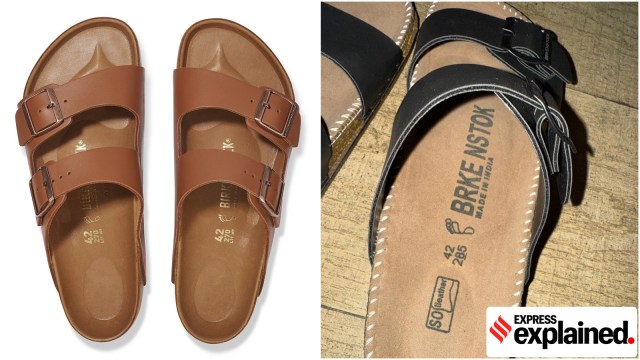Birkenstock lawsuit: craft and commerce of India’s knockoff market
Birkenstock recently moved the Delhi High Court over the sale of cheap copies of its signature sandals. India’s role as both a manufacturing hub and consumer market for counterfeit fashion goods has long posed challenges for global brands. What drives this?
 Copies of Birkenstock's signature sandals are a common sight in bustling street markets. (Photos: Birkenstock/Express)
Copies of Birkenstock's signature sandals are a common sight in bustling street markets. (Photos: Birkenstock/Express)At Agra’s bustling Sardar Bazaar or Delhi’s Palika Bazaar, it’s not unusual to find a pair of open-toe leather sandals selling for Rs 1,000. They look strikingly similar to the signature sandals made by Birkenstock, the German footwear brand, whose retail price in India is in the Rs 5,000-Rs 20,000 range.
This everyday sight recently became central to a high-profile intellectual property dispute when Birkenstock took legal action against some Indian manufacturers for allegedly producing and selling counterfeit versions of their signature sandals.
What happened?
In May, Birkenstock filed a civil lawsuit in Delhi High Court against four traders, four factories, and two individuals based in Agra and Delhi, accusing them of manufacturing and distributing footwear that closely resembled Birkenstock’s registered designs.
Following the complaint, the court appointed local commissioners to conduct raids at the identified premises, during which large consignments of counterfeit sandals were seized. The court also issued temporary injunctions restraining the accused parties from producing or selling footwear bearing Birkenstock’s trademarks or design likeness.
The case is scheduled for its next hearing on October 6.
Birkenstock sandals are known for their cork footbeds and minimalist design, providing comfort and durability. They gained more pop culture currency after actor Margot Robbie wore a pair in the popular 2023 movie Barbie.
The ‘first copy’ business in India
India’s role as both a manufacturing hub and consumer market for counterfeit fashion goods has long posed challenges for global brands. From luxury handbags to sportswear and footwear, ‘first copies’ or ‘dupes’ are readily available across informal markets and increasingly on online platforms.
A significant portion of India’s population harbours a strong desire to emulate global fashion trends and own branded goods. However, India is also a highly price-sensitive market, and when a ‘first copy’ offers a nearly identical aesthetic of a luxury product for a fraction of the price, there is a ready demand for it.
The Organisation for Economic Co-operation and Development (OECD), in a 2022 report prepared in collaboration with the EU Intellectual Property Office (EUIPO), identified India as a key origin country for counterfeit goods traded globally, alongside China, Turkey, and the UAE.
According to a 2022 study by CRISIL and the Authentication Solution Providers’ Association (ASPA), as many as 31% of Indian consumers admitted to knowingly purchasing counterfeit products, with apparel and footwear being the most common categories.
The same report has also estimated that counterfeit goods make up about 25-30 per cent of India’s retail market. The country’s informal retail sector, characterised by busy street markets and small shops, provides a highly effective and widespread distribution network for these goods.
The digital age has added a new dimension, with e-commerce platforms and social media (especially Instagram and Whatsapp) becoming major channels for selling counterfeits.
Terms like ‘AAA’ quality or ‘first copy’ are used to market these items, leveraging influencers to promote them without explicitly using copyrighted terms.
The artisan and the market
Seen along with another footwear controversy in India recently — Prada using Kolhapuri sandals’ design, initially without credit — the trend points to a unique problem facing India’s artisans.
India’s traditional centers, like Agra for leather goods or various textile hubs, have a long history of craftsmanship. Their infrastructure and skilled labour are often leveraged by market forces to produce lookalike products, sometimes for local consumption and sometimes for export.
Also, while big brands like Birkenstock have the resources to pursue legal remedies, small artisan communities like those involved in the Kolhapuri chappal trade have historically struggled to protect their work on international platforms.
The law, and the limits of protection
Under Indian law, brands can protect their products through the Trademarks Act, 1999, and the Designs Act, 2000. These allow the right for legal action, court injunctions, and the seizure of counterfeit stock.



- 01
- 02
- 03
- 04
- 05



































